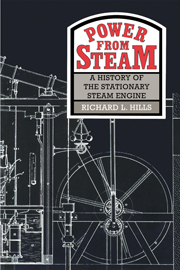Book contents
- Frontmatter
- Contents
- Preface
- Acknowledgements
- List of figures
- List of tables
- 1 The noblest machine
- 2 The impellent force of fire
- 3 Common old smoaking engines
- 4 The economy of power
- 5 The devil of rotations
- 6 Such unbounded power
- 7 Good servants but bad masters
- 8 An uncultivated field
- 9 The new theory of heat
- 10 The internal operation of the machine
- 11 Such absolute smoothness
- 12 Twinkle twinkle little arc
- 13 The drive for efficiency
- 14 An economical source of motive power
- 15 The most economical mode of obtaining power
- Notes
- Bibliography
- Index
5 - The devil of rotations
Watt's engines for driving mills (1790s)
Published online by Cambridge University Press: 01 June 2011
- Frontmatter
- Contents
- Preface
- Acknowledgements
- List of figures
- List of tables
- 1 The noblest machine
- 2 The impellent force of fire
- 3 Common old smoaking engines
- 4 The economy of power
- 5 The devil of rotations
- 6 Such unbounded power
- 7 Good servants but bad masters
- 8 An uncultivated field
- 9 The new theory of heat
- 10 The internal operation of the machine
- 11 Such absolute smoothness
- 12 Twinkle twinkle little arc
- 13 The drive for efficiency
- 14 An economical source of motive power
- 15 The most economical mode of obtaining power
- Notes
- Bibliography
- Index
Summary
‘Look round the metropolis’, exclaims Sir Humphrey Davy, ‘our towns, even our villages, our dockyards, and our manufactories; examine the subterraneous cavities below the surface, and the works above; contemplate our rivers and our canals, and the seas which surround our shores, and everywhere will be found records of the eternal benefits conferred on us by this great man’.
The Boulton & Watt rotative engine made a dramatic impact on the standard of civilisation and was one of the crucial machines which helped to launch the Industrial Revolution. This engine became the standard design for providing rotative power everywhere, even for a short period on board ships. It was a design which other manufacturers found they had to copy or else face failure. Some tried other types, but
In many instances, the makers were obliged to give up the pursuit, after having made a few engines. Others who had better means of execution, and who took care to study Mr. Watt's models very closely, succeeded so far as to establish themselves in the business.
Even the Watt engine needed many years of trials and modifications before it became the paragon and envy of everybody.
The total number of engines built by the Boulton & Watt partnership up to 1800 was 496, of which 38 per cent were pumping and 62 per cent rotative, mostly for the textile industry. There were 164 pumping engines, 24 blowing engines and 308 engines driving machinery.
- Type
- Chapter
- Information
- Power from SteamA History of the Stationary Steam Engine, pp. 70 - 94Publisher: Cambridge University PressPrint publication year: 1989



